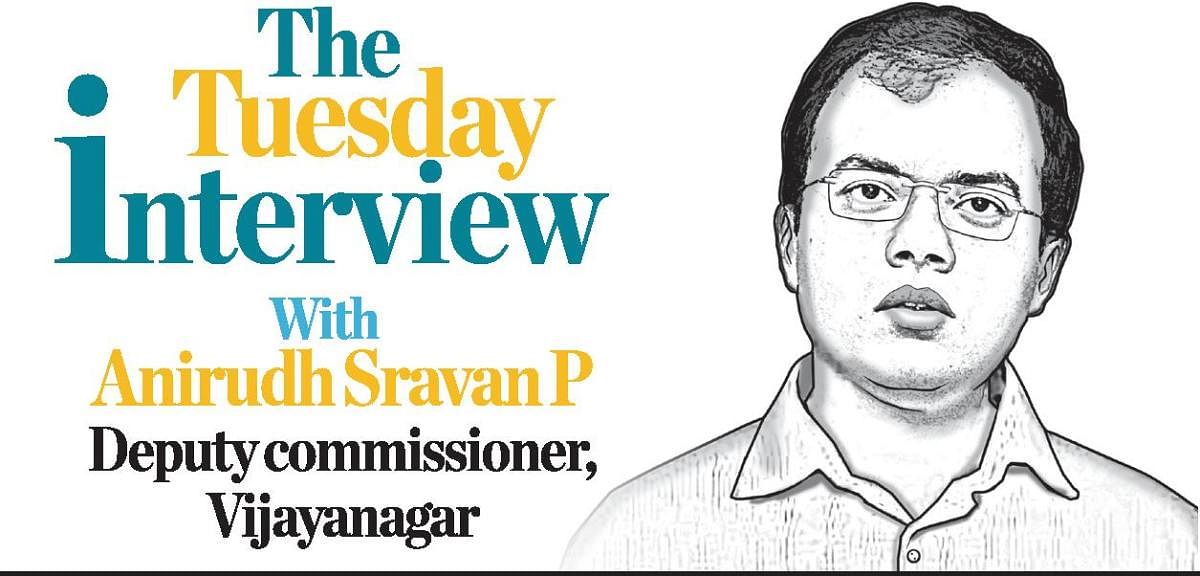
The state government recently inaugurated Karnataka's thirty-first district, Vijayanagar. Anirudh Sravan P, the first deputy commissioner (DC) of the new district, in an interview with Shruthi HM Sastry of DH, gives a glimpse into the effort that goes into setting up a new district and measures to be taken for its development. The new district has six new taluks including Hosapete, Kottur, Hagari Bommanahalli, Hoovina Hadagali, Kudligi and Harapanahalli, with Hosapete as the district headquarters. Excerpts from the interview:
What are the immediate goals to kick-start the administration of the new district?
The immediate concern is to set up offices in the new district so that officials can begin fulfilling their roles. For example, there are about 63 posts in the deputy commissioner’s office. As of now, only the DC has been appointed. Similarly, we need to set up the office of the superintendent of police, the district health office, agriculture office, registrar’s office, among others. There is also work to be done in terms of certain legislation, for instance, the law pertaining to Stamps and Registration. We will have to notify Vijayanagar as a registration district where there will be a district registrar. The idea is that the services that are presently available in Ballari should also be available in Vijayanagar.
From an administrative point of view, what is the larger vision for the new district?
From my end, I will hold several consultations with subject-matter experts and public representatives on setting a larger development agenda for the new district. Overall, with the new district, we want to ensure a people-friendly, responsive and transparent administration. With Hosapete as the district headquarters, it is not just about geographical proximity to all the taluks but people should also feel that the new district has made accessing government facilities easier. This is also the vision of Chief Minister Basavaraj Bommai.
Vijayanagar is the seventh district in the Kalyana Karnataka region. The region has largely lagged behind in Sustainable Development Goals (SDGs). What are some of the challenges that you foresee?
The district has immense scope for improvement on SDGs. When it comes to education, we need to focus on setting up higher education institutions. At present, most of the higher education institutions are in Ballari and students from here have to depend on the colleges there. This is also important from the perspective of ensuring higher education for girls. If they have to travel too far, there is a risk of them dropping out. That apart, there is much work to do in terms of tackling malnutrition too.
As we stand at the threshold of a post-pandemic situation, is there a road map for strengthening health infrastructure in the district?
Since Ballari was supplying oxygen to the rest of the state, the district administration has done a good job of equipping hospitals with oxygen generation plants. Infrastructure in taluk hospitals is also not an issue as equipment was purchased during the pandemic. However, there are gaps when it comes to healthcare at large. We don’t have a district hospital as of date. But the good thing is that the government has already sanctioned it. We will ensure it begins functioning at the earliest. There are also gaps with regard to the number of Primary Health Centres per population and the doctors available. We will get these issues addressed.
The other challenge for the region has been the lack of industrial development and employment generation. What do you think are the interventions required?
During the Chief Minister’s recent review, he had emphasised the development of Hampi as a tourist destination. In terms of employment generation, it might not be manufacturing-driven but it is tourism that will be the mainstay. If Hampi receives a boost, hopefully, this will lead to positives all around. Tourism minister Anand Singh, who represents the district, has been putting efforts to initiate several tourism projects. Taluks such as Kottur, Koodligi and Harapanahalli are agriculture-centric. Hence these taluks see agri-allied commerce.
There are complaints that funds under the Special Development Plan as envisaged under the Nanjundappa committee are not allocated to the taluks in need.
In the new district, except Hosapete, the other five taluks qualify for SDP, with Harapanahalli and Kudligi being the most backward taluks. Allocations under SDP are made according to the recommendations of the Nanjundappa Committee.
The region has been ravaged by mines over time. What measures will be taken for environmental conservation?
Close to 85% of the mining areas are in Sandur taluk in Ballari. In Vijayanagar, Hosapete and Harapanahalli have been affected by mining. In terms of environmental degradation, almost 30% of the impact of mines located on the hills of Sandur is on Vijayanagar. This challenge will be addressed over a period of time using the available funds.
There are concerns that Ballari and Vijayanagar will be contesting over the District Mineral Fund.
This issue has been discussed. The government will take an appropriate decision and will issue directions in this regard.
Check out latest DH videos here
